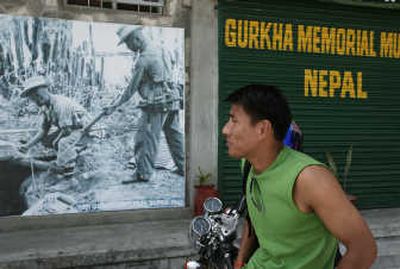Tradition draws Nepalese to battle

POKHARA, Nepal – Two centuries later, young men are still being drawn from their poverty-stricken Himalayan hills by the thousands to fight – and die – with legendary valor for another man’s country far away.
In an era when the world’s armies are hard pressed to fill their ranks, the Gurkhas are a recruiter’s dream: Last year 17,349 applied to join the British military, and after grueling physical, medical and mental tests 230 were accepted – just one in 75.
These warriors could be regarded as Britain’s mercenaries: Good money and adventure are major attractions. But ask almost any Gurkha soldier, and he is also likely to talk of history and upholding a tradition of being among the world’s finest infantrymen.
This reputation was first acquired in the 19th century, after the British thought it wiser to recruit rather than fight foes who bloodied them badly when they moved northward out of colonial India into Nepal.
From those days, through the two world wars, to today’s Afghanistan, the spine-chilling cry of “Ayo Gurkhali!” – “The Gurkhas are coming!” – has sent enemies quaking. Some have surrendered rather than face a relentless charge by the rugged soldiers wielding their trademark kukri knives.
“Afghanistan was a test for the modern Gurkha, to show our forefathers that we are still meeting the standards they set. It was our chance to show that we are continuing the tradition. So far, so good,” said Sgt. Belbahadur Gurung, a third-generation British army Gurkha back home after a widely lauded combat tour.
With his new motorcycle and designer sunglasses, the handsome 31-year-old platoon sergeant cut a dashing figure, as did comrades from the 1st Battalion Royal Gurkha Rifles, savoring leave with family, friends and envious hopefuls in this western Nepal city.
In some years as many as 60,000 seek to join. Most don’t even get to the application stage; others are filtered out because they fail to meet qualifications ranging from English and math skills to having no more than two tooth fillings.
“Getting into the British army is like winning a lottery,” said Capt. Rupert Anderson, operations officer at British Gurkhas Pokhara camp, the main recruiting center in Nepal.
And some will do anything to win. Last year, 515 false application documents were detected while a number of candidates – required to be 17 1/2 to 21 years old – lied about their age, the captain said.
“Those who fail are totally downcast. Many don’t go home for days. Everyone cries,” said Mansing Gurung, senior area recruiting officer and a retired Gurkha officer.
The successful swear loyalty to the queen and are whisked away into an alien world – the moors of Yorkshire, England – for 37 weeks of training including a course on the British way of life.
“We have no such opportunities in Nepal. Once you get selected, it’s the solution to everything. That’s why we are so crazy about it,” said 20-year-old Bibek Thapa, preparing for December’s test – his third and final chance.
Studying for a business management degree, Thapa said he could expect about 6,000 rupees ($90) a month in his first job. British army pay, by contrast, would start at $2,000 plus free room and board – enough for most soldiers to contribute handsomely to their families’ welfare and Nepal’s foreign exchange earnings.
“Never has a nation had such loyal and good soldiers for so long at so cheap a price,” said J.P. Cross, a retired lieutenant colonel who served with Gurkha troops for 38 years. “Since 1815, these people have regarded the British as kindly fathers who liberated them from a caste system and replaced it with meritocracy, who looked upon them as individuals and matchless soldiers,” he said.
Will the sun ever set on this relic of the British Empire? “That question has been asked again and again,” said Maj. Rick Beven, commander of British Gurkhas Pokhara. “After World War II, the partition of India, the handover of Hong Kong. But they’re still here. As long as there are operations and they do well, there will be a future for them in the British army.”